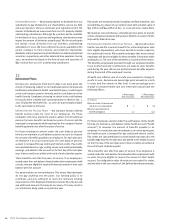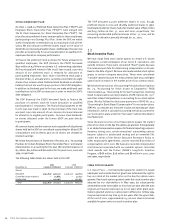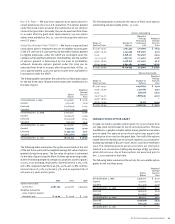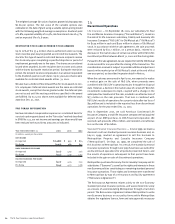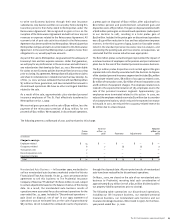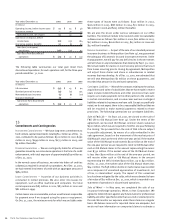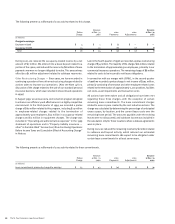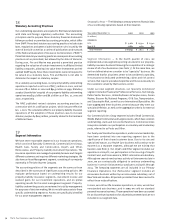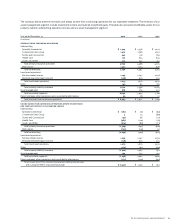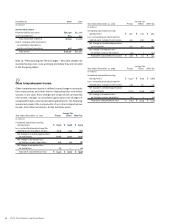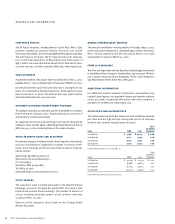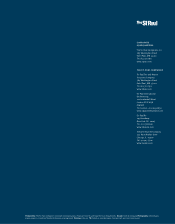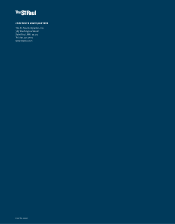Travelers 2001 Annual Report Download - page 71
Download and view the complete annual report
Please find page 71 of the 2001 Travelers annual report below. You can navigate through the pages in the report by either clicking on the pages listed below, or by using the keyword search tool below to find specific information within the annual report.
The St. Paul Companies 2001 Annual Report 69
17
Reinsurance
The primary purpose of our ceded reinsurance program, including
the aggregate excess-of-loss coverages discussed below, is to
protect us from potential losses in excess of what we are prepared
to accept. We expect the companies to which we have ceded
reinsurance to honor their obligations. In the event these companies
are unable to honor their obligations to us, we will pay these
amounts. We have established allowances for possible nonpayment
of amounts due to us. As described in Note 2, we increased our
provision for uncollectible reinsurance by $47 million after the 2001
terrorist attack.
We report balances pertaining to reinsurance transactions “gross”
on the balance sheet, meaning that reinsurance recoverables on
unpaid losses and ceded unearned premiums are not deducted from
insurance reserves but are recorded as assets.
The largest concentration of our total reinsurance recoverables and
ceded unearned premiums at Dec. 31, 2001 was with General
Reinsurance Corporation (“Gen Re”). Gen Re (with approximately
22% of our recoverables) is rated “A+ +” by A.M. Best, “Aaa” by
Moody’s and “AAA” by Standard & Poor’s for its financial strength.
During each of the years 2001, 2000 and 1999, we entered into two
aggregate excess-of-loss reinsurance treaties. One of these treaties
in each year was corporate-wide, with coverage triggered when our
insurance losses and LAE across all lines of business reached a
certain level, as prescribed by terms of the treaty (the “corporate
program”). Additionally, our Reinsurance segment benefited from
cessions made under a separate treaty in each year unrelated to the
corporate treaty. The combined impact of these treaties (together,
the “reinsurance treaties”) is included in the table that follows.
Year ended December 31 2001 2000 1999
(In millions)
Corporate program:
Ceded written premiums $9$ 419 $ 211
Ceded losses and loss
adjustment expenses (25) 709 384
Ceded earned premiums 9419 211
Net pretax benefit (detriment) (34) 290 173
Reinsurance segment treaty:
Ceded written premiums 119 55 62
Ceded losses and loss
adjustment expenses 278 122 150
Ceded earned premiums 119 55 62
Net pretax benefit 159 67 88
Combined total:
Ceded written premiums 128 474 273
Ceded losses and loss
adjustment expenses 253 831 534
Ceded earned premiums 128 474 273
Net pretax benefit $125 $ 357 $ 261
Under the 1999 and 2000 corporate treaties, we ceded losses to the
reinsurer when our corporate-wide incurred insurance losses and
LAE exceeded accident year attachment loss ratios specified in the
contract. We paid the ceded earned premiums shortly after the
coverage under the treaties was invoked. We will recover the ceded
losses and LAE from our reinsurer as we settle the related claims,
which may occur over several years. For the separate Reinsurance
segment treaties, for all three years, we remit the premiums ceded
(plus accrued interest) to our counterparty when the related losses
and LAE are settled.
During 2001, we did not cede losses to the corporate treaty. The
$9 million written and earned premiums ceded in 2001 represented
the initial premium paid to our reinsurer. Our primary purpose in
entering into the corporate reinsurance treaty was to reduce the
volatility in our reported earnings over time. Because of the
magnitude of losses associated with the Sept. 11 terrorist attack,
that purpose could not be fulfilled had the treaty been invoked to
its full capacity in 2001. In addition, our actuarial analysis concluded
that there would be little, if any, economic value to us in ceding
any losses under the treaty. As a result, in early 2002, we mutually
agreed with our reinsurer to commute the 2001 corporate treaty
for consideration to the reinsurer equaling the $9 million initial
premium paid.
The $25 million change in our estimate of ceded losses and LAE in
2001 in the table above represented an adjustment for losses ceded
under our 2000 corporate treaty. Deterioration in our 2000 accident
year loss experience in 2001 caused our expectations of the payout
patterns of our reinsurer to change and resulted in our conclusion
that losses originally ceded in 2000 would exceed an economic limit
prescribed in the 2000 treaty.
The effect of assumed and ceded reinsurance on premiums
written, premiums earned and insurance losses and loss
adjustment expenses is as follows (including the impact of the
reinsurance treaties).
Year ended December 31 2001 2000 1999
(In millions)
premiums written
Direct $7,135 $ 6,219 $ 4,622
Assumed 2,700 2,064 1,645
Ceded (2,072) (2,399) (1,155)
Net premiums written $7,763 $ 5,884 $ 5,112
premiums earned
Direct $ 6,656 $5,819 $4,621
Assumed 2,685 2,019 1,537
Ceded (2,045) (2,246) (1,055)
Total premiums earned $ 7,296 $ 5,592 $ 5,103
insurance losses and
loss adjustment expenses
Direct $6,876 $ 4,068 $ 3,532
Assumed 3,952 1,798 1,124
Ceded (3,349) (1,953) (936)
Total net insurance losses and
loss adjustment expenses $7,479 $ 3,913 $ 3,720



